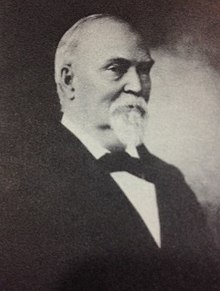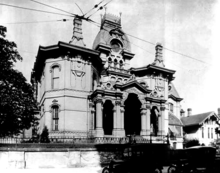| Napoleon Hill | |
|---|---|
 Portrait of Napoleon Hill (1830–1909) Portrait of Napoleon Hill (1830–1909) | |
| Born | (1830-08-25)August 25, 1830 Tennessee, U.S. |
| Died | November 2, 1909(1909-11-02) (aged 79) Memphis, Tennessee, U.S. |
| Occupation | businessman |
| Citizenship | American |
| Spouse | Mary Morton Wood Hill (1835–1922) |
| Children |
|
Napoleon Hill (1830–1909) was an American businessman of Memphis, Tennessee, tagged as "the merchant prince of Memphis" by his contemporaries. He first inherited wealth from his father, made more in the California Gold Rush, and then moved to Memphis, where he became a leading businessman and investor. Hill was the second of eleven children of Duncan Hill, a physician and plantation owner, and Olivia L. Bill. Duncan Hill died in 1844, leaving his mother the Marshall County, Mississippi plantation, worth $40,000 at the time. She remarried to Josiah Deloach in 1848 and she and the children continued to live on the plantation. At age sixteen Hill left home and worked as a store clerk for a time, but left Tennessee for the 1849 California Gold Rush. Successful in California, he returned to Tennessee and by 1857 was living in Memphis, where he built a wholesale grocery business and traded in cotton on commission just before the American Civil War.


Hill prospered in Memphis, and during the post-Civil War period he became a one of Memphis' most significant businessmen. His largest investment was Hill, Fontaine and Company, a cotton and wholesale grocery business. In addition, he invested in banks, real estate, and industrial development. Hill participated in organizing The Memphis Cotton Exchange in 1873 and served as its president from 1881 to 1883. In 1885 Hill and other prominent Memphis businessmen started a Memphis streetcar line, later acquired by the Memphis City Railroad Company. Hill was an early investor in the Birmingham, Alabama, steel industry, and was a major investor in Memphis' Union and Planters Bank, predecessor of Union Planters, and served as a bank director.
Hill's businesses and investments made him wealthy, powerful, and socially prominent. In 1881 Hill built a large mansion in the ornate French Renaissance style at the corner of 3rd and Madison Streets in downtown Memphis. The central business district location later led to its downfall, as the landmark mansion was torn down by 1930 to build the Sterick Building. In 1902 he commissioned the Scimitar Building at 179 Madison Avenue and Third Street, directly across from his home.
Personal life and death
During their lives, Hill and his wife, Morton Wood Hill, received extensive coverage in Memphis newspapers, both for his business, civic and political activities, as well as for their social affairs. For example, a reception held by Mrs. Hill in 1891 received detailed coverage, "The event of the week in society circles was the afternoon reception given by Mrs. Napoleon Hill Wednesday afternoon...."
Hill died in 1909 and is buried in Elmwood Cemetery in Memphis. At the time of his death, his estate was considered the largest in Tennessee.
References
- ^ Napoleon Hill. City of Memphis, Board of Health, Burial Certificate No. 1706, November 2, 1909. Retrieved August 20, 2019.
- Ancestry.com. Tennessee, Marriage Records, 1780–2002 . Lehi, UT, USA: Ancestry.com Operations Inc, 2008. Retrieved August 20, 2019.
- Political Horoscope Memphis Daily Appeal (Memphis, Tennessee) · 19 Mar 1888, Mon · Page 4. Accessed 22 August 2019.
- Brevities The Scottsboro Citizen (Scottsboro, Alabama) · Thu, Nov 4, 1909 · Page 3. Accessed 22 August 2019.
- ^ Lester, Connie L. (March 1, 2018). "Napoleon Hill". Tennessee Encyclopedia. Tennessee Historical Society. Retrieved August 20, 2019.
- Josiah Deloach and Olivia Hill. In: Ancestry.com. Mississippi, Compiled Marriage Index, 1776–1935 . Provo, UT, USA: Ancestry.com Operations Inc, 2004.
- 1850 United States Federal Census . Provo, UT, USA: Ancestry.com Operations, Inc., 2009. Year: 1850; Census Place: Northern Division, Marshall, Mississippi; Roll: M432_377; Page: 371B; Image: 331.
- Willoughby, Lynn. Fair to Middlin': The Antebellum Cotton Trade of the Apalachicola/Chattahoochee River Valley. University of Alabama Press, April 19, 2009. Chapter 5: Financing the Cotton Trade, pp. 90–99.
- "Other Business Interests: The Memphis Chamber of Commerce in Regular Session." The Daily Memphis Avalanche, 04 Mar 1873, Page 4
- "Strictly Business: Twelve Hundred Thousand Dollars for Three Railroads: Meeting of the Chamber of Commerce." Memphis Daily Appeal, 04 Mar 1873, Page 4
- Memphis on the Up Grade: Climbing the Hill of Prosperity With Greatest Ease. The Memphis Commercial, 22 Oct 1893, Page 5.
- ^ In Society. The Memphis Appeal-Avalanche, 01 Feb 1891, Page 5.
- Obituaries: Napoleon Hill. Arkansas Democrat (Little Rock, Arkansas) · 2 Nov 1909, Tue, Page 6. Newspapers.com. Accessed: 21 August 2019.
External links
- Napoleon Hill at Find a Grave
- Elmwood Cemetery Photos on Facebook: Napoleon Hill.